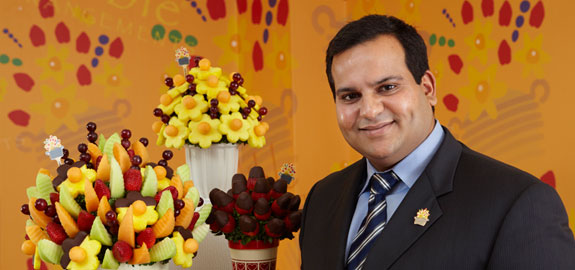By Nicole Carter July 14, 2011
How do you keep a smooth supply chain when you sell perishable goods on an international scale? Edible Arrangements’s co-founder and COO Kamran Farid shares his secret.

(Edible Arrangements’s co-founder and COO Kamran Farid talks about supply chain challenges and solutions as the company continues to expand overseas.)
In 1999, the first Edible Arrangements store, which offered delivery fruit bouquets, opened in East Haven, Connecticut. Today, founders and brothers Tariq and Kamran Farid have an empire over 1,000 stores, spanning 10 countries like Italy, Saudi Arabia, Puerto Rico, and Turkey. But banking their business on perishable fruit bouquets poses unique supply chain challenges as the company continues to expand overseas. Kamran, the company’s COO, recently spoke to Inc.com‘s Nicole Carter.
When you are considering entering a market overseas, what are the initial steps?
We actually go there, scout out the produce markets and local farms. That’s step one. We try to figure out what they grow, and if that can compliment what we want to sell. When you look at our arrangements, there are five or six basic fruits. If we find the fruits we are looking for, we then look at sizing, pricing, what the yeilds would be (since the box units vary in size from place to place), and then we see if the price model will work.
What happens if a foreign market doesn’t produce one of your desired fruits locally?
We either fly in the item or compliment with a similar local item. Take pineapples—which don’t grow everywhere. The pineapples used in our Dubai or Saudi Arabia stores are usually flown in from somewhere else, like Costa Rica. Also, the best strawberries are usually from right here in the United States. We ship those to a lot of our overseas markets. Our dry goods are also, for the most part, shipped in. We’ve actually just opened a warehouse in Dubai, which helps streamline a lot of the shipping process. If we can’t ship in, we substitute with something similar in color, taste, and texture. We try to find a balance.
What if the locals don’t like the fruits in the traditional arrangements?
This is, of course, something else we consider. What does the local market want? In Saudi Arabia, you’ll see dates in the arrangements, which is a local favorite.
What was the biggest challenge when you guys decided to expand?
Definitely picking the right producers to partner with. We need a partner that is a master in that market, because it’s very important to have someone that can help further develop the brand. We say no to a lot of deals, but I’m okay with that. It’s about quality. Bottomline: If we can’t do an item and do it well, I don’t want to be there.
Which international location has been growing the fastest?
Saudi Arabia is a top market and so is Dubai. There’s a lot of extra income in those markets and, when it comes time to give a unique gift, we do well.
What’s next on the international check list?
Korea. China. We just signed a deal in India, and we will be opening soon. But there’s no longterm list. We are doing this one step at a time, because we want to be good at it.
It seems that there is quite a cross-cultural demand for fruit bouquets!
That’s the beauty of fruit. We can adapt it to whatever holiday or culture because at the end of the day, people like eating fruit.
Source:http://www.inc.com/articles/201107/kamran-farid-edible-arrangement-managing-global-supply-chain.html



